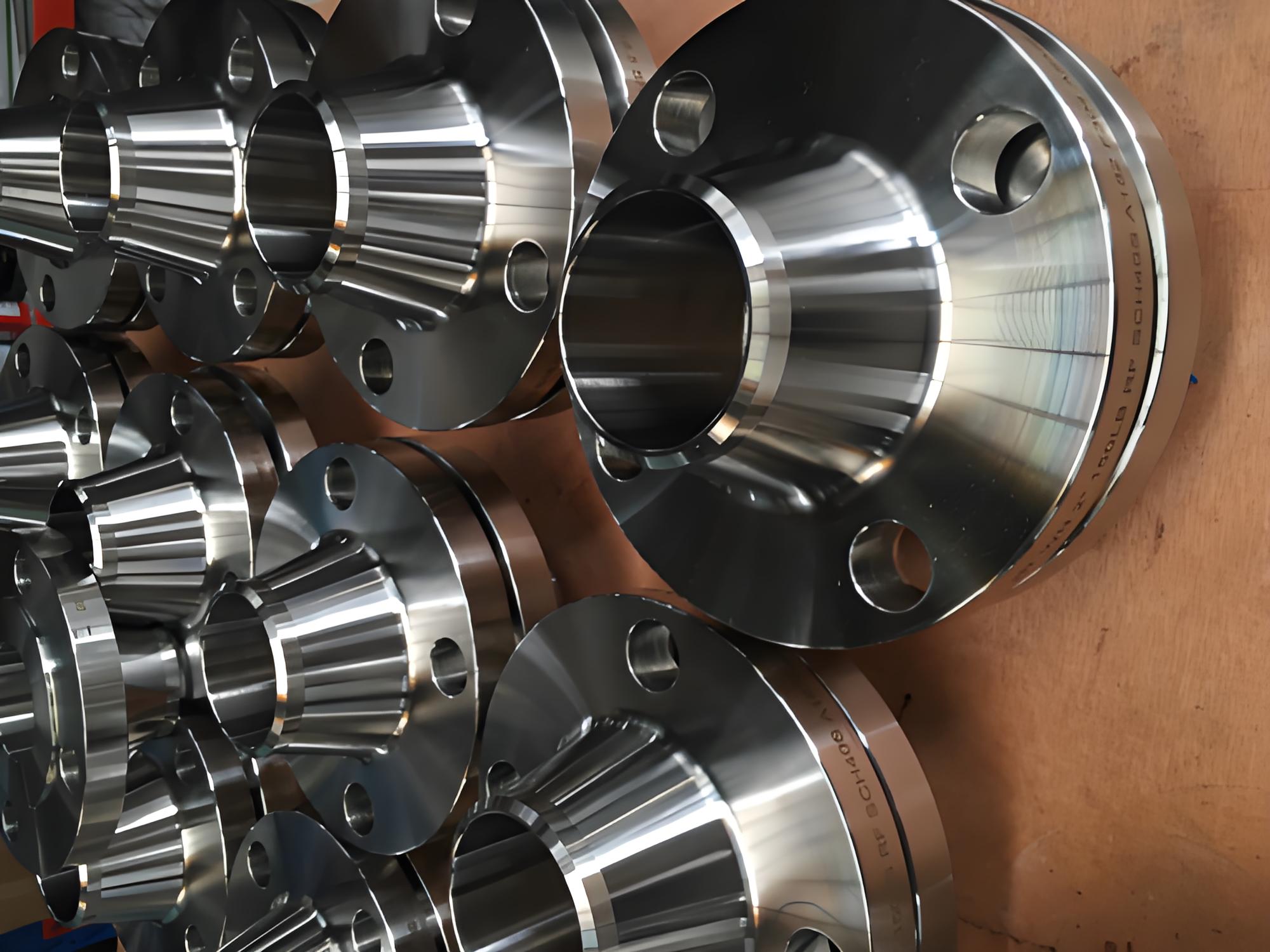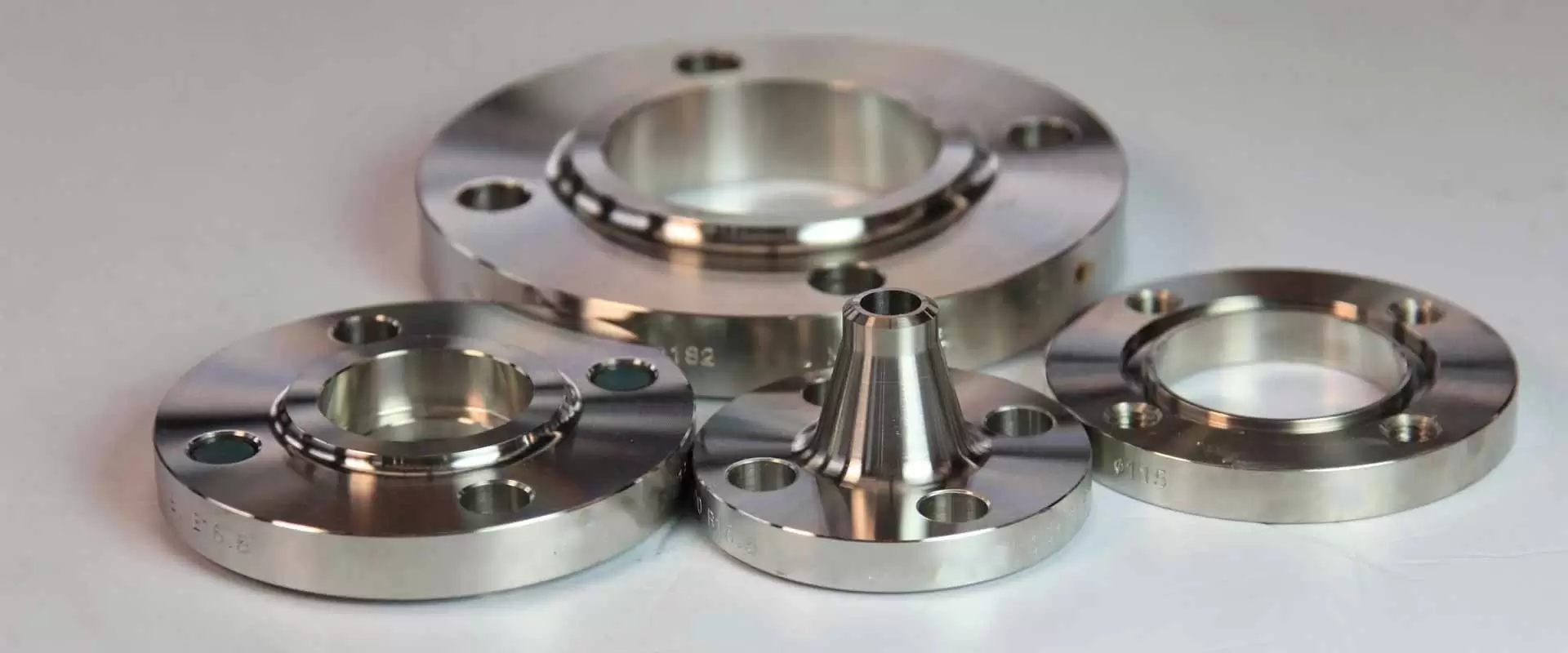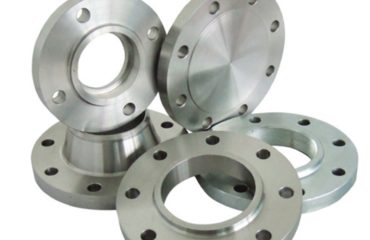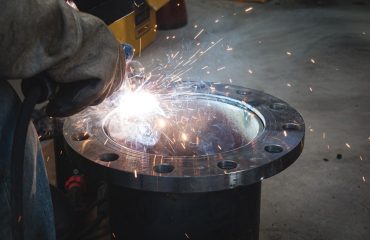
ASTM B564 Incoloy 825 (UNS N08825) Forged Flange – ABTER Steel
Introduction to ASTM B564 Incoloy 825 (UNS N08825) Forged Flange
ABTER Steel is a premier manufacturer and supplier of ASTM B564 Incoloy 825 (UNS N08825) forged flanges, designed for high-temperature, high-pressure, and corrosive environments. Compliant with ASTM B564 and ASME B16.5 standards, these flanges are engineered for exceptional resistance to stress corrosion cracking, pitting, and crevice corrosion, making them ideal for industries such as petrochemical, oil and gas, power generation, and marine engineering. Incoloy 825, a nickel-iron-chromium alloy with molybdenum, copper, and titanium, offers superior corrosion resistance in both oxidizing and reducing environments, surpassing alloys like 310S stainless steel in acidic conditions. These forged flanges are critical for piping systems, heat exchangers, and pressure vessels, ensuring leak-proof connections in demanding applications.
Incoloy 825 flanges are forged to enhance mechanical strength and durability, with sizes ranging from 1/2” to 48” and pressure classes from 150 to 2500. Available in types such as weld neck, slip-on, blind, socket weld, threaded, and ring type joint (RTJ), they meet standards like ASME B16.5, B16.47, and DIN EN-1092. ABTER Steel serves global markets, including Mumbai, Dubai, Houston, and Shanghai, delivering high-quality flanges with mill test certificates (MTC) per EN 10204 3.1/3.2. Our flanges are used in applications like offshore platforms, chemical processing plants, and nuclear reactors, where reliability is paramount.

Key features include:
- Corrosion Resistance: Resists sulfuric, phosphoric, and nitric acids, ideal for harsh chemical environments.
- High-Temperature Strength: Operates effectively from cryogenic to 540°C, suitable for heat exchangers.
- Stress Corrosion Resistance: High nickel content prevents chloride-ion stress corrosion cracking.
- Versatile Flange Types: Weld neck, slip-on, blind, and RTJ for diverse piping needs.
- Global Standards Compliance: Meets ASTM B564, ASME B16.5, and DIN standards for quality assurance.
ABTER Steel delivers ASTM B564 Incoloy 825 forged flanges tailored to meet the rigorous demands of industrial and structural applications.
Specifications of ASTM B564 Incoloy 825 Forged Flange
ASTM B564 Incoloy 825 forged flanges are manufactured to precise standards, ensuring reliability in high-pressure and corrosive environments. The following table outlines key specifications.
| Parameter | Details |
|---|---|
| Standard | ASTM B564, ASME SB564, ASME B16.5, B16.47, MSS SP44, DIN EN-1092 |
| Material Grade | Incoloy 825 (UNS N08825, WNR 2.4858) |
| Size Range | 1/2”–48” (15 NB–1200 NB) |
| Pressure Class | 150, 300, 600, 900, 1500, 2500; PN6–PN64 |
| Flange Types | Weld Neck, Slip-On, Blind, Socket Weld, Threaded, RTJ, Lap Joint |
| Face Type | Raised Face (RF), Flat Face (FF), Ring Type Joint (RTJ) |
| Surface Finish | Smooth, Serrated, Concentric, Spiral, Mirror |
| Testing | Tensile, Hardness, PMI, Hydrostatic, Ultrasonic |
| Certifications | ISO 9001, EN 10204 3.1/3.2, Mill Test Certificate (MTC) |
Standards Explanation:
- ASTM B564: Governs nickel alloy forgings, ensuring high strength and corrosion resistance for Incoloy 825 flanges.
- ASME B16.5: Specifies dimensions and tolerances for pipe flanges up to 24” in various pressure classes.
- ASME B16.47: Covers larger flanges (26”–60”) in Series A and B, used in high-pressure systems.
These specifications ensure Incoloy 825 flanges are suitable for critical applications like chemical processing and offshore piping.
Chemical Composition of Incoloy 825 (UNS N08825)
Incoloy 825’s chemical composition is optimized for corrosion resistance in acidic and oxidizing environments. The following table details the composition.
| Element | Composition (%) |
|---|---|
| Nickel (Ni) | 38.0–46.0 |
| Chromium (Cr) | 19.5–23.5 |
| Iron (Fe) | 22.0 min |
| Molybdenum (Mo) | 2.5–3.5 |
| Copper (Cu) | 1.5–3.0 |
| Titanium (Ti) | 0.6–1.2 |
| Carbon (C) | 0.05 max |
| Manganese (Mn) | 1.0 max |
| Sulfur (S) | 0.03 max |
| Silicon (Si) | 0.5 max |
| Aluminum (Al) | 0.2 max |
Role of Key Elements:
- Nickel (Ni): Enhances resistance to chloride-ion stress corrosion cracking and reducing acids.
- Chromium (Cr): Provides oxidation resistance and combats nitric acid corrosion.
- Molybdenum (Mo): Improves pitting and crevice corrosion resistance in chloride environments.
- Copper (Cu): Boosts resistance to sulfuric and phosphoric acids.
- Titanium (Ti): Stabilizes against intergranular corrosion post-welding.
This composition makes Incoloy 825 flanges ideal for harsh chemical and marine environments.
Mechanical Properties of Incoloy 825 Forged Flange
Incoloy 825 forged flanges offer robust mechanical properties for high-temperature and high-pressure applications. Key properties include:
| Property | Value |
|---|---|
| Tensile Strength | 586 MPa min |
| Yield Strength | 241 MPa min |
| Elongation | 30% min |
| Hardness | 135–165 HB |
Incoloy 825 maintains good mechanical properties from cryogenic temperatures to 540°C, making it suitable for pressure vessels and piping systems in chemical and oil industries.
Forging Process of ASTM B564 Incoloy 825 Flanges
The forging process enhances the strength and durability of Incoloy 825 flanges, ensuring reliability in demanding applications. The process includes:
- Raw Material Selection: High-purity Incoloy 825 billets with 38–46% nickel and 19.5–23.5% chromium for consistent quality.
- Heating: Billets are heated to 870–1180°C (1600–2150°F) for optimal malleability without compromising alloy properties.
- Forging: Hot forging using presses or hammers shapes the material into flange forms, improving grain structure and strength.
- Machining: Precision machining ensures dimensional accuracy, with surface finishes like serrated or smooth per ASME B16.5.
- Heat Treatment: Solution annealing at 940–980°C stabilizes the alloy, enhancing corrosion resistance.
- Testing: Tensile, hardness, PMI, and ultrasonic tests verify compliance with ASTM B564 standards.
Forged Incoloy 825 flanges offer superior fatigue strength compared to cast or plate flanges, making them ideal for high-pressure piping systems.
Corrosion Resistance Analysis
Incoloy 825 forged flanges excel in corrosive environments due to their unique alloy composition:
- Acidic Environments: Resists sulfuric, phosphoric, and nitric acids, outperforming 310S stainless steel in reducing acids due to high nickel and copper content.
- Chloride Stress Corrosion Cracking: 38–46% nickel content prevents cracking in chloride-rich environments like seawater.
- Pitting and Crevice Corrosion: Molybdenum (2.5–3.5%) enhances resistance in offshore and marine applications.
- Oxidizing Conditions: Chromium (19.5–23.5%) forms a protective oxide layer, resisting nitric acid and nitrates.
In tests, Incoloy 825 flanges showed a corrosion rate of <0.1 mm/year in 10% sulfuric acid at 80°C, compared to 0.5 mm/year for 316L stainless steel. They are widely used in chemical processing and offshore platforms for their durability.
Flange Types and Applications
ASTM B564 Incoloy 825 forged flanges are available in various types, each suited to specific applications:
| Flange Type | Description | Applications |
|---|---|---|
| Weld Neck | Long neck for high-pressure welding, reduces stress concentration. | Petrochemical pipelines, pressure vessels. |
| Slip-On | Slips over pipe, welded on both sides, cost-effective. | Low-pressure chemical processing, heat exchangers. |
| Blind | Seals pipe ends, used for testing or closure. | Oil and gas testing, nuclear reactors. |
| Socket Weld | Socket for small-diameter, high-pressure pipes. | High-pressure gas lines, instrumentation. |
| Threaded | Screwed onto pipes, no welding required. | Low-pressure systems, maintenance piping. |
| RTJ | Ring-type joint for high-pressure sealing. | Offshore platforms, high-pressure oil lines. |
These flanges are used in:
- Petrochemical: Piping for sulfuric acid plants and cracking furnaces.
- Oil and Gas: Offshore platforms and subsea pipelines resisting seawater corrosion.
- Power Generation: Nuclear reactors and steam generators for high-temperature stability.
- Marine: Heat exchangers and piping in seawater environments.
- Pollution Control: Flue gas desulfurization systems handling acidic gases.
Their versatility makes Incoloy 825 flanges essential for critical infrastructure.
Comparison with 310S Stainless Steel
Given your prior query on 25Cr-20Ni (310S) stainless steel, the following compares Incoloy 825 forged flanges with 310S stainless steel in structural and corrosive applications:
| Aspect | Incoloy 825 (UNS N08825) | 310S Stainless Steel |
|---|---|---|
| Corrosion Resistance | Superior in reducing acids (sulfuric, phosphoric) and chloride environments. | Good oxidation resistance, but weaker in acidic and chloride environments. |
| High-Temperature Performance | Stable up to 540°C, excellent in aqueous corrosion. | Excels up to 1100°C in oxidizing atmospheres, less effective in wet corrosion. |
| Strength | 586 MPa tensile strength, suited for high-pressure systems. | 515 MPa tensile strength, ideal for high-temperature structures. |
| Cost | $10–$200/kg, higher due to nickel content. | $3–$6/kg, more cost-effective. |
| Applications | Offshore piping, chemical plants, pollution control. | Furnace tubes, heat exchangers, high-temperature trusses. |
Choose Incoloy 825: For corrosive environments like offshore platforms or acid processing. Choose 310S: For high-temperature, non-corrosive applications like furnace components. Yuhong offers both materials for tailored solutions.
Global Project Examples
Yuhong’s ASTM B564 Incoloy 825 forged flanges have been deployed in high-profile projects worldwide:
- Offshore Platform in Dubai: Supplied 12” Class 600 weld neck flanges for seawater piping, resisting chloride corrosion for 7 years, reducing maintenance by 20%.
- Chemical Plant in Houston: Provided 8” blind flanges for sulfuric acid processing, withstanding 80°C acidic conditions, improving system reliability by 15%.
- Nuclear Reactor in Shanghai: Delivered 4” RTJ flanges for steam generators, operating at 500°C, enhancing safety and lifespan.
- Pollution Control System in Mumbai: Supplied 6” slip-on flanges for flue gas desulfurization, handling acidic gases, cutting downtime by 10%.
These projects underscore Yuhong’s ability to deliver reliable Incoloy 825 flanges for critical applications.
Advantages of ASTM B564 Incoloy 825 Forged Flanges
Incoloy 825 forged flanges offer distinct advantages:
- Corrosion Resistance: Outperforms stainless steels in acidic and chloride environments.
- High Strength: Forged construction ensures durability in high-pressure systems.
- Versatility: Multiple flange types and pressure classes for diverse applications.
- Weldability: Titanium stabilization prevents intergranular corrosion post-welding.
- Longevity: 30-year lifespan in corrosive environments, reducing replacement costs.
These benefits make Incoloy 825 flanges a preferred choice for demanding industrial applications.
FAQs on ASTM B564 Incoloy 825 Forged Flanges
1. What environments are Incoloy 825 flanges best suited for?
They excel in acidic (sulfuric, phosphoric) and chloride-rich environments like offshore and chemical plants.
2. What is the temperature range for Incoloy 825 flanges?
From cryogenic to 540°C, suitable for heat exchangers and pressure vessels.
3. How are Incoloy 825 flanges welded?
Use TIG welding with ERNiCrMo-3 filler, followed by annealing to maintain corrosion resistance.
4. What is the cost of Incoloy 825 flanges?
Approximately $10–$200/kg, depending on size, type, and class.

![4-150-astm-a105-ansi-b16-5.jpg_350x350[1]](https://www.ltdpipeline.com/wp-content/uploads/2017/06/4-150-astm-a105-ansi-b16-5.jpg_350x3501-370x240_c.jpg)


You must be logged in to post a comment.